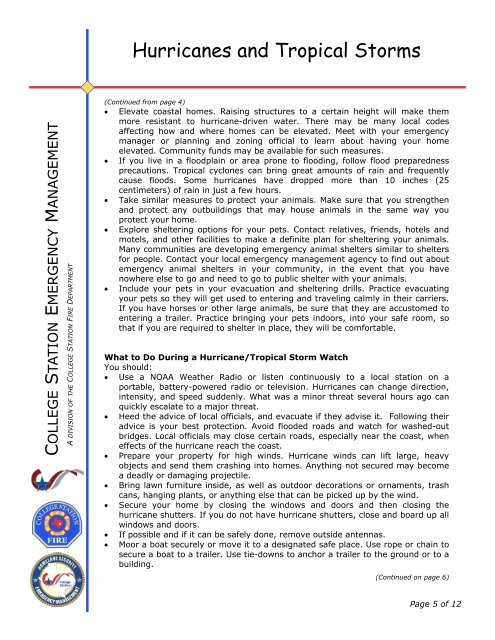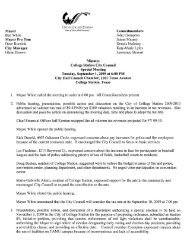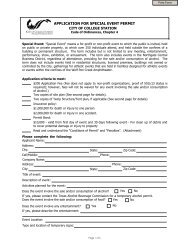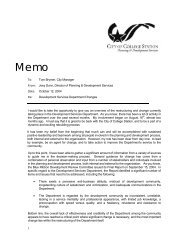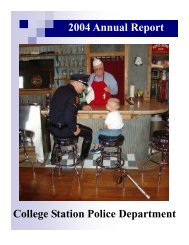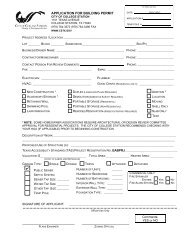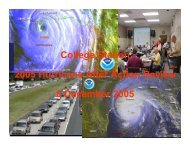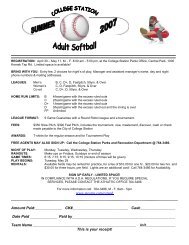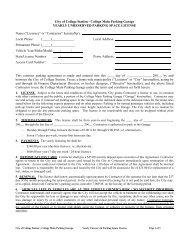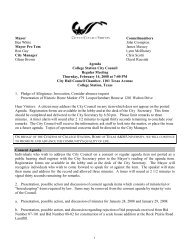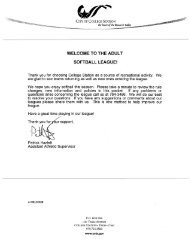Hurricanes and Tropical Storms - City of College Station
Hurricanes and Tropical Storms - City of College Station
Hurricanes and Tropical Storms - City of College Station
Create successful ePaper yourself
Turn your PDF publications into a flip-book with our unique Google optimized e-Paper software.
<strong>Hurricanes</strong> <strong>and</strong> <strong>Tropical</strong> <strong>Storms</strong><br />
COLLEGE STATION EMERGENCY MANAGEMENT<br />
A DIVISION OF THE COLLEGE STATION FIRE DEPARTMENT<br />
(Continued from page 4)<br />
• Elevate coastal homes. Raising structures to a certain height will make them<br />
more resistant to hurricane-driven water. There may be many local codes<br />
affecting how <strong>and</strong> where homes can be elevated. Meet with your emergency<br />
manager or planning <strong>and</strong> zoning <strong>of</strong>ficial to learn about having your home<br />
elevated. Community funds may be available for such measures.<br />
• If you live in a floodplain or area prone to flooding, follow flood preparedness<br />
precautions. <strong>Tropical</strong> cyclones can bring great amounts <strong>of</strong> rain <strong>and</strong> frequently<br />
cause floods. Some hurricanes have dropped more than 10 inches (25<br />
centimeters) <strong>of</strong> rain in just a few hours.<br />
• Take similar measures to protect your animals. Make sure that you strengthen<br />
<strong>and</strong> protect any outbuildings that may house animals in the same way you<br />
protect your home.<br />
• Explore sheltering options for your pets. Contact relatives, friends, hotels <strong>and</strong><br />
motels, <strong>and</strong> other facilities to make a definite plan for sheltering your animals.<br />
Many communities are developing emergency animal shelters similar to shelters<br />
for people. Contact your local emergency management agency to find out about<br />
emergency animal shelters in your community, in the event that you have<br />
nowhere else to go <strong>and</strong> need to go to public shelter with your animals.<br />
• Include your pets in your evacuation <strong>and</strong> sheltering drills. Practice evacuating<br />
your pets so they will get used to entering <strong>and</strong> traveling calmly in their carriers.<br />
If you have horses or other large animals, be sure that they are accustomed to<br />
entering a trailer. Practice bringing your pets indoors, into your safe room, so<br />
that if you are required to shelter in place, they will be comfortable.<br />
What to Do During a Hurricane/<strong>Tropical</strong> Storm Watch<br />
You should:<br />
• Use a NOAA Weather Radio or listen continuously to a local station on a<br />
portable, battery-powered radio or television. <strong>Hurricanes</strong> can change direction,<br />
intensity, <strong>and</strong> speed suddenly. What was a minor threat several hours ago can<br />
quickly escalate to a major threat.<br />
• Heed the advice <strong>of</strong> local <strong>of</strong>ficials, <strong>and</strong> evacuate if they advise it. Following their<br />
advice is your best protection. Avoid flooded roads <strong>and</strong> watch for washed-out<br />
bridges. Local <strong>of</strong>ficials may close certain roads, especially near the coast, when<br />
effects <strong>of</strong> the hurricane reach the coast.<br />
• Prepare your property for high winds. Hurricane winds can lift large, heavy<br />
objects <strong>and</strong> send them crashing into homes. Anything not secured may become<br />
a deadly or damaging projectile.<br />
• Bring lawn furniture inside, as well as outdoor decorations or ornaments, trash<br />
cans, hanging plants, or anything else that can be picked up by the wind.<br />
• Secure your home by closing the windows <strong>and</strong> doors <strong>and</strong> then closing the<br />
hurricane shutters. If you do not have hurricane shutters, close <strong>and</strong> board up all<br />
windows <strong>and</strong> doors.<br />
• If possible <strong>and</strong> if it can be safely done, remove outside antennas.<br />
• Moor a boat securely or move it to a designated safe place. Use rope or chain to<br />
secure a boat to a trailer. Use tie-downs to anchor a trailer to the ground or to a<br />
building.<br />
(Continued on page 6)<br />
Page 5 <strong>of</strong> 12


